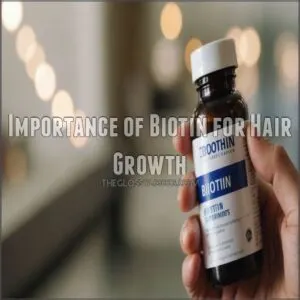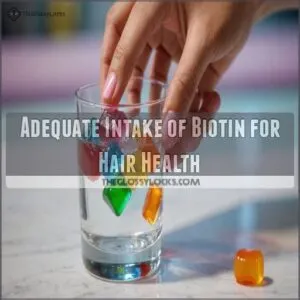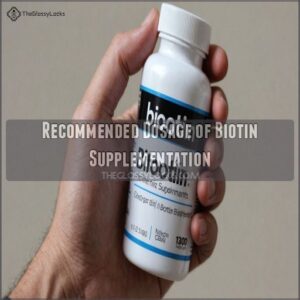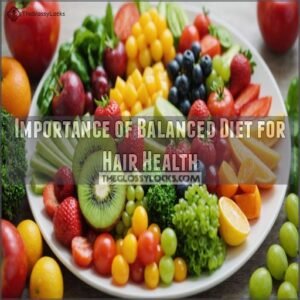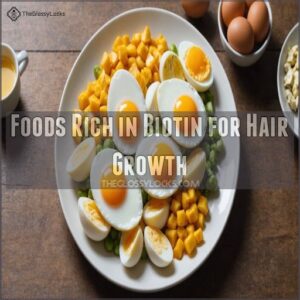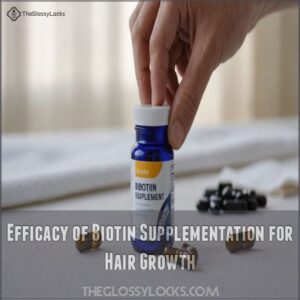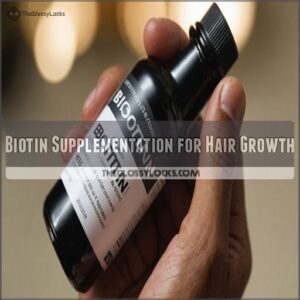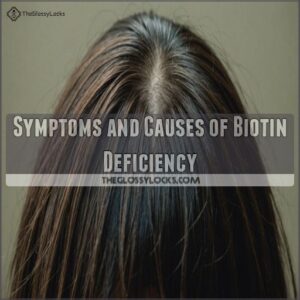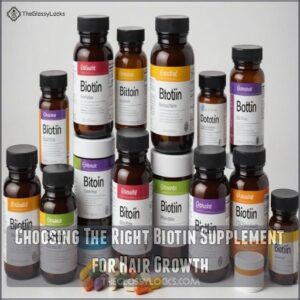This site is supported by our readers. We may earn a commission, at no cost to you, if you purchase through links.
 You’ve probably heard that biotin can work wonders for your hair, but how much do you really need?
You’ve probably heard that biotin can work wonders for your hair, but how much do you really need?
The recommended daily intake for adults is typically 30-100 micrograms.
However, for hair growth, you might need more.
Many experts suggest 2-5 mg (2,000-5,000 mcg) daily to see noticeable results.
Don’t worry, biotin is water-soluble, so excess is usually excreted.
Still, it’s best to consult your doctor before starting any supplement regimen.
Remember, biotin isn’t a magic bullet – it works best when combined with a balanced diet and proper hair care.
Curious about other factors that might be affecting your luscious locks?
Table Of Contents
- Key Takeaways
- Importance of Biotin for Hair Growth
- Recommended Daily Intake of Biotin for Hair Growth
- Biotin-Rich Foods for Hair Growth
- Efficacy of Biotin Supplementation for Hair Growth
- Biotin Supplementation for Hair Growth
- Symptoms and Causes of Biotin Deficiency
- Potential Risks and Side Effects of Excessive Biotin Intake
- Choosing The Right Biotin Supplement for Hair Growth
- Frequently Asked Questions (FAQs)
- How much biotin should I take a day for hair growth?
- Do biotin supplements prevent hair loss?
- Can biotin help men grow hair?
- How long does biotin take to grow hair?
- Should you take a biotin supplement for hair & nail growth?
- Can biotin help hair grow faster and thicker?
- Is 10,000 mcg biotin too much for hair?
- What is the downside of taking biotin?
- How much biotin should I take daily for hair growth in MG?
- Is 5000 mcg biotin too much?
- Can biotin help with other hair issues?
- How long does it take to see results?
- Is topical biotin effective for hair growth?
- Can biotin interact with other hair growth treatments?
- Are there alternatives to biotin for hair growth?
- Conclusion
Key Takeaways
- While biotin supplements or biotin-rich foods can strengthen hair, the recommended daily intake of biotin for adults is 30-100 micrograms, experts suggest 2-5 mg (2,000-5,000 mcg) daily for noticeable hair growth results.
- Biotin supplements are most effective if you have a deficiency, but for most people, a balanced diet provides sufficient biotin for hair health.
- Don’t expect instant results; it can take 3-6 months to notice changes in hair growth from biotin supplementation.
- Before starting biotin supplements, consult your doctor to determine if you need them and to avoid potential interference with lab tests or other medications.
Importance of Biotin for Hair Growth
While biotin is essential for energy production and nutrient absorption, its role in promoting hair growth is more anecdotal than scientifically proven.
Although a biotin deficiency can lead to hair loss, increasing your biotin intake doesn’t guarantee a luscious mane unless a deficiency is the underlying issue.
Role of Biotin in Hair Health
Let’s explore biotin’s role in hair health!
Biotin, a B vitamin, plays a key part in the production of keratin, a protein that makes up your hair.
While it won’t magically grow hair overnight, sufficient biotin contributes to stronger, healthier-looking strands.
Addressing biotin deficiency is key; however, for many, a balanced diet is enough.
Don’t fall for hair growth myths; focus on overall well-being.
Consider biotin supplements only if a doctor recommends them after evaluating your specific needs, especially if you’re experiencing thinning hair or suspect a deficiency.
Effects of Biotin Deficiency on Hair
When biotin deficiency strikes, your hair might feel brittle, thin, and less vibrant.
Imagine this: strands snapping like twigs in winter.
That’s how vital biotin is for your scalp health.
Consider these three impacts:
- Hair Thinning: Struggling to style your hair?
- Brittle Hair: Breakage becomes your new normal.
- Scalp Health: An itchy, flaky nightmare.
Relationship Between Biotin and Hair Loss
We all worry about hair loss, and you might wonder if biotin is the magic fix.
Biotin deficiency indeed plays a role in hair shedding, though not the only culprit.
Some research has shown that biotin may improve hair thickness and reduce loss in people with a deficiency, highlighting the importance of biotin supplements.
Factors like genetics and diet also contribute.
Often, biotin supplements are touted for hair growth, but remember, without an actual deficiency, they might be about as effective as myths suggest.
Recommended Daily Intake of Biotin for Hair Growth
While there’s no official daily allowance for biotin, experts suggest that an intake of 30 micrograms per day is generally sufficient for maintaining healthy hair.
Most people already get enough biotin from their diet, but if you’re thinking about supplements, it’s best to talk to a doctor, especially since personal needs can vary.
Adequate Intake of Biotin for Hair Health
Ready to boost your hair game with biotin? Understanding the recommended daily intake matters.
Though the FDA doesn’t specify, 30 micrograms is often suggested to maintain healthy hair.
Naturally found in foods like eggs and nuts, biotin supports hair growth.
But remember, unless a deficiency exists, extra biotin might just overdo it rather than help.
Recommended Dosage of Biotin Supplementation
Curious about biotin dosage for hair growth?
While a lack of biotin can lead to hair loss, most people get enough through diet.
A daily intake of 30 mcg of biotin might suffice, but supplements could help if you’re deficient.
However, too much biotin might mess with lab results, so chat with your doctor before starting supplements.
Individual Variations in Biotin Requirements
Age, genetics, and health conditions can influence your biotin needs.
While 30 mcg is often suggested, individual requirements may vary.
Pregnancy or medications might increase your biotin necessity.
Most people meet their needs through diet, but if you’re considering biotin supplements for hair growth, you may also want to try using rice water for hair as a natural remedy to strengthen hair roots and aid in hair regeneration, a healthcare professional can guide your dosage for the best possible hair growth results.
Biotin-Rich Foods for Hair Growth
You can boost your biotin intake naturally through your diet!
Many foods, like eggs, nuts, and sweet potatoes, are packed with this essential vitamin, supporting healthy hair growth from the inside out.
Best Dietary Sources of Biotin
Understanding the best dietary sources of biotin can help maintain strong, healthy hair.
Here’s your go-to list:
- Eggs, particularly yolks—nature’s protein pack.
- Nuts, like almonds and walnuts—snack smartly.
- Sweet potatoes, for a delicious dose.
These biotin-rich foods boost hair growth naturally.
Embrace this list for better biotin absorption and flourishing hair.
Importance of Balanced Diet for Hair Health
Maintaining hair health isn’t just about stocking up on biotin-rich foods.
A balanced diet plays a starring role.
Think about it: without proper nutrition, your hair might face the music of dullness and breakage.
Here’s a quick guide to key nutrients:
| Nutrient | Benefits | Sources |
|---|---|---|
| Protein | Builds strength | Eggs, chicken |
| Omega-3 | Adds shine | Fish, flaxseeds |
| Iron | Prevents loss | Spinach, lentils |
Foods Rich in Biotin for Hair Growth
Cracking the secret to luscious locks can start with what’s on your plate.
You can find a variety of biotin-rich foods for hair growth on a website dedicated to biotin and hair growth, like eggs, almonds, and sweet potatoes into your hair growth diet can help.
These nutrient powerhouses boost biotin levels naturally, which is vital for hair strength and shine.
Remember, a balanced intake through diverse food sources beats any supplement.
Efficacy of Biotin Supplementation for Hair Growth
You’ll find plenty of products claiming biotin can transform your thinning hair into luscious locks, but the scientific evidence tells a different story.
While biotin supplements, such as Vitamin B7, play a crucial role in strengthening the scalp and strands and promoting fast-paced growth, especially for 4C hair care, can help if you’re deficient in this vitamin, research hasn’t proven they’ll boost hair growth in people with normal biotin levels.
Proven Efficacy in Biotin Deficiency
The science behind biotin’s effectiveness shines brightest when you’re dealing with a true deficiency. Research shows biotin supplements can effectively reverse hair loss in people with diagnosed biotin deficiency.
Here’s what you need to know:
- A 2017 study found 38% of women with hair loss had low biotin levels.
- Supplements work best for those with specific risk factors.
- Quick results typically appear within 3-6 months.
- Treatment usually requires 5mg daily dosage.
- Your doctor can test for deficiency through blood work.
Limited Research on Hair and Nail Growth
Despite biotin’s popularity for hair growth, scientific evidence remains surprisingly thin.
You’ll find plenty of success stories online, but a thorough 2017 analysis couldn’t find solid clinical trials backing these claims.
If you don’t have a biotin deficiency, supplements may not help your hair grow.
While the estimated adequate intake for adults is 30 micrograms daily, research gaps persist, and scientists still need to conduct more rigorous studies to verify biotin’s effectiveness, especially for individuals who are already getting enough biotin through their regular diet and biotin-rich food sources.
Research gaps persist, and scientists still need to conduct more rigorous studies to verify biotin’s effectiveness.
Importance of Addressing Underlying Causes of Hair Loss
While you might feel tempted to stock up on biotin supplements, identifying the root cause of your hair loss should be your first step.
Hair thinning can stem from hormonal imbalances, stress, or medical conditions that won’t improve with biotin alone.
You’ll get better results by working with a healthcare provider to pinpoint and treat the underlying cause of your hair loss.
Biotin Supplementation for Hair Growth
If you’re considering taking biotin supplements for hair growth, you’ll need to understand the right dosage and potential effects on your body.
While healthcare professionals may prescribe up to 5 mg of biotin daily for deficiency-related hair loss, you’ll want to consult your doctor first since high doses can affect laboratory test results.
Mega B-Vitamin Combination for Hair Growth
Many hair experts recommend a diet rich in protein, vitamins, and healthy fats for optimal hair growth, including foods for hair growth. Many hair experts recommend combining biotin with other B-vitamins for the best hair growth results.
You can find a variety of supplements offering this combination at online stores like B vitamin hair supplements.
You’ll get better results from a B-vitamin complex than biotin alone, as these vitamins work together synergistically.
Here’s what a complete B-vitamin supplement should include:
- B7 (biotin)
- B12 to support red blood cell formation
- B6 to help regulate hormones, which play a crucial role in maintaining a balance between androgens and estrogens that stimulate hair follicles, affecting hair growth
Side Effects and Precautions of Biotin Supplementation
Taking biotin supplements isn’t all sunshine and roses.
You’ll need to stop taking them 72 hours before any lab tests since they can skew results, especially thyroid and heart-related screenings.
If you’re pregnant or have diabetes, you’ll want to watch your dosage carefully.
Some folks experience mild side effects like nausea or skin breakouts.
Drug interactions can occur with certain medications, particularly anticonvulsants.
Importance of Consulting a Healthcare Professional
Your health-savvy decision to consult a doctor before starting biotin supplements can save you time and worry.
They’ll check for underlying causes of hair loss and recommend the right biotin dosage hair growth plan.
You’ll need to tell them about any medications you’re taking, as biotin can interfere with lab tests and affect supplement interactions.
They’ll help track your biotin hair growth results safely.
Symptoms and Causes of Biotin Deficiency
You’ll notice the first signs of biotin deficiency through thinning hair, skin rashes, and tiredness, which can affect anyone from pregnant women to those taking certain medications.
While your body usually gets enough biotin from food and gut bacteria, certain factors like malnutrition, medications, or digestive problems can prevent you from absorbing this essential vitamin properly.
Signs of Biotin Deficiency
Spotting biotin deficiency can be tricky, but it’s key to addressing hair growth issues.
You might notice thinning hair or increased shedding.
Keep an eye out for skin rashes, especially around your nose and mouth.
Feeling unusually tired or having trouble concentrating? These could be signs too.
You can find a wide variety of biotin supplements for hair to help support your hair health.
In some cases, you may experience neurological symptoms like tingling in your extremities.
Don’t panic, though – these symptoms can have other causes, so it’s best to consult a doctor for a proper diagnosis.
Factors Contributing to Biotin Deficiency
Biotin deficiency isn’t just about what you eat.
Several factors can throw your body’s biotin balance off-kilter: Certain medications can also reduce biotin levels, such as antibiotics, which can interfere with biotin metabolism and absorption.
Intestinal issues: Conditions like Crohn’s disease can hinder biotin absorption.
Medications: Some antibiotics and anticonvulsants interfere with biotin metabolism.
Lifestyle choices: Excessive alcohol use can impair biotin uptake.
Pregnancy also increases biotin needs.
If you’re experiencing hair loss or skin issues, these factors might be at play.
Understanding them helps you take control of your biotin levels and your hair health.
At-Risk Groups for Biotin Deficiency
While many of us take biotin for granted, certain groups face a higher risk of deficiency.
Let’s explore who’s most vulnerable and why:
| At-Risk Group | Reason | Impact on Hair |
|---|---|---|
| Pregnant women | Increased demand | Thinning, breakage |
| People with intestinal issues | Poor absorption | Slow growth, loss |
| Chronic alcohol users | Impaired metabolism | Brittle, dull hair |
| Antibiotic users | Gut flora disruption | Shedding, weakness |
Understanding these risks can help you take control of your hair health.
If you fall into one of these groups, consider talking to your doctor about biotin supplementation.
Potential Risks and Side Effects of Excessive Biotin Intake
While biotin is generally safe, excessive intake can lead to unexpected consequences. High doses may interfere with certain lab tests, potentially causing misleading results that could affect your medical care.
Interference With Lab Tests
Taking high doses of biotin can throw a wrench in your lab results. It’s like your body’s playing a trick on the tests, potentially leading to misdiagnosis. You might think you’re boosting hair growth, but you’re actually messing with your health checks. Always let your doctor know if you’re taking biotin supplements before any blood work. High doses of biotin, especially above 10,000 mcg, can also lead to other issues like biotin-related headaches (Biotin and Headaches).
- Your thyroid results could be normal, leaving you feeling helpless
- Troponin levels might appear normal when they’re not, masking heart issues
- False negatives could have you missing critical diagnoses
- Inaccurate results might lead to unnecessary worry or treatments
Overdose Symptoms of Biotin
Excess biotin isn’t typically toxic, but it can throw a wrench in your health monitoring.
High biotin levels may interfere with lab tests, potentially masking serious conditions.
You might experience skin rashes, digestive issues, or kidney problems in rare cases.
It’s essential to stick to recommended doses and chat with your doctor before starting any new supplement regimen.
Remember, more isn’t always better in terms of biotin supplementation.
Considerations for Diabetes and Biotin Intake
Biotin’s relationship with diabetes is complex.
If you have diabetes, you should know that biotin may affect your blood sugar levels.
Some studies suggest biotin could lower blood glucose and improve insulin sensitivity.
However, it’s not a substitute for your diabetes medication.
Always consult your doctor before starting biotin supplements, especially if you’re managing diabetes.
They’ll help you balance potential benefits for hair growth with your overall health needs.
Choosing The Right Biotin Supplement for Hair Growth
Choosing the right biotin supplement for hair growth can be tricky with so many options available.
You’ll want to think about factors like dosage, quality, and potential interactions with medications or health conditions before making a decision.
Key Factors to Consider When Choosing a Supplement
While excessive biotin intake can be risky, choosing the right supplement is key.
You’ll want to keep these things in mind:
- Dosage: Look for supplements that provide 30-100 mcg of biotin daily.
- Ingredients: Check for additional hair-supporting nutrients like vitamins B5, C, and E.
- Brand reputation: Research companies known for quality biotin hair growth supplements.
Remember, what works for your friend might not work for you. It’s like finding the perfect shampoo – it takes some trial and error.
Importance of Quality and Purity
When choosing a biotin supplement for hair growth, quality and purity are paramount.
Look for reputable biotin supplement brands that undergo rigorous purity testing and have supplement certifications.
Check the ingredient sourcing to make sure they’re free from potential contaminants.
Opt for supplements that clearly state their biotin dosage for hair growth.
Remember, a higher price doesn’t always guarantee better quality.
Do your research and read reviews to find a trustworthy brand that meets your needs.
Consulting a Healthcare Professional for Guidance
Figuring out biotin supplements can feel like a maze.
You’re not alone if you’re unsure about the right dosage for hair growth.
That’s where a healthcare pro comes in handy.
They’ll consider your unique needs, potential deficiencies, and any underlying health issues.
Plus, they can guide you on supplement safety and warn you about possible lab test interference.
Don’t hesitate to reach out – your hair (and health) will thank you!
Frequently Asked Questions (FAQs)
How much biotin should I take a day for hair growth?
The golden locks you seek aren’t guaranteed by biotin alone.
There’s no magic number for hair growth.
If you’re not deficient, extra biotin won’t help.
Focus on a balanced diet and consult a doctor for personalized advice.
Do biotin supplements prevent hair loss?
Biotin supplements don’t prevent hair loss unless you’re deficient.
Most people get enough from their diet.
If you’re losing hair, it’s best to consult a doctor to address the underlying cause rather than relying solely on supplements.
Can biotin help men grow hair?
You’ve likely heard the buzz about biotin for hair growth.
While it’s essential for overall health, there’s no solid evidence it’ll help you sprout new locks.
If you’re not deficient, extra biotin probably won’t make a difference.
How long does biotin take to grow hair?
Honestly, there’s no definitive timeline for biotin-induced hair growth.
While some folks report changes in 3-6 months, scientific evidence is lacking.
Your results may vary based on individual factors and any underlying deficiencies.
Patience is key!
Should you take a biotin supplement for hair & nail growth?
Taking biotin supplements for hair and nail growth isn’t necessary unless you’re deficient, and the recommended daily intake is generally 30 mcg for adults.
Most people get enough from their diet.
If you’re concerned, consult a doctor before supplementing.
Focus on a balanced diet for overall health instead.
Can biotin help hair grow faster and thicker?
Hold your horses, biotin isn’t a magic potion for hair growth.
While it’s essential for healthy hair, there’s no solid evidence it’ll make your locks grow faster or thicker unless you’re deficient.
Eat a balanced diet instead.
Is 10,000 mcg biotin too much for hair?
A 10,000 mcg biotin dose is excessive for hair growth.
You don’t need that much, as most people get enough from their diet.
High doses can interfere with lab tests, so it’s best to consult your doctor first.
What is the downside of taking biotin?
Biotin’s main downside is its potential to interfere with lab test results, especially for thyroid function and troponin levels.
You’ll need to inform your doctor about biotin supplementation before any diagnostic tests to avoid misinterpretation of results.
How much biotin should I take daily for hair growth in MG?
While 38% of women with hair loss show biotin deficiency, there’s no scientifically proven daily dose for hair growth.
The FDA suggests 30 mcg is adequate for most.
You’ll find biotin in foods like eggs and nuts, making supplements often unnecessary.
Is 5000 mcg biotin too much?
Taking 5000 mcg of biotin isn’t typically harmful, but it’s more than you need.
Most people get enough from their diet.
High doses can interfere with lab tests, so always tell your doctor if you’re supplementing.
Can biotin help with other hair issues?
Thinning strands, meet biotin’s potential.
You’ll find this B-vitamin might help with brittleness and breakage, but it’s not a cure-all.
For most hair woes, biotin’s benefits shine brightest when you’re deficient.
Consider a balanced approach for healthier locks.
How long does it take to see results?
Results from biotin supplementation aren’t immediate.
You’ll need patience – it can take 3-6 months to notice changes in hair growth.
Remember, biotin’s effectiveness varies, and it’s not a guaranteed solution for everyone’s hair concerns.
Is topical biotin effective for hair growth?
While topical biotin’s effectiveness for hair growth isn’t well-established, research is limited.
You’d likely benefit more from addressing underlying causes and maintaining a balanced diet.
If you’re concerned, consult a dermatologist for personalized advice on hair health.
Can biotin interact with other hair growth treatments?
Picture a symphony of hair treatments working in harmony.
Biotin can play well with others, but it’s wise to consult your doctor.
Some combinations might amplify results, while others could clash.
Always prioritize safety in your hair growth journey.
Are there alternatives to biotin for hair growth?
Several alternatives to biotin can support hair growth.
You might try vitamins A and D, iron, zinc, or omega-3 fatty acids.
Minoxidil and finasteride are FDA-approved treatments.
Natural options include saw palmetto, pumpkin seed oil, and rosemary essential oil.
Conclusion
Biotin’s like a tiny building block for your hair, but finding the right dose can be tricky.
While 30-100 mcg is standard, how much biotin you need for hair growth varies.
Some experts recommend 2-5 mg daily, but it’s not one-size-fits-all.
Remember, biotin’s just part of the puzzle.
A balanced diet, proper hair care, and addressing underlying issues are key.
Before popping supplements, chat with your doc.
They’ll help you navigate the path to healthier hair, ensuring you’re not just chasing a quick fix.

